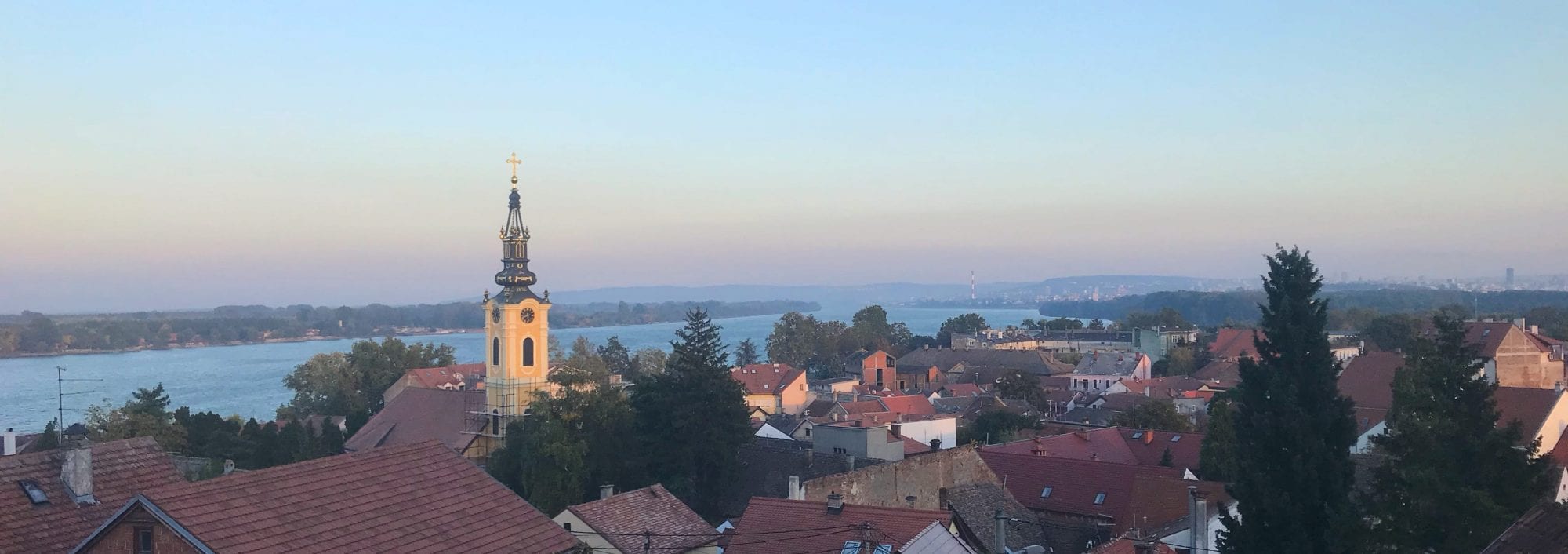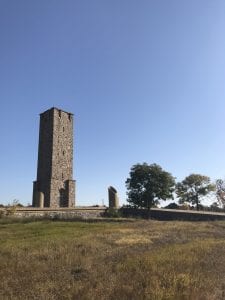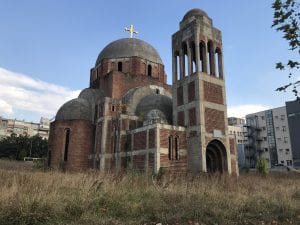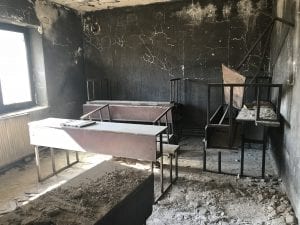When you drive into Kosovo from Serbia, something you’ll notice immediately is the use of two languages on city signs. Priština, the capital of Kosovo, is spelled Pristinë in Albanian, the majority language of Kosovo.
The controversy of Kosovo cannot be explained easily, especially considering the contested histories and narratives of this specific region – but I will try my best to give you an idea…
Way back in the early 14th century, the Balkans was inhabited by many different ethnic groups – including Serbs and Albanians. However the Ottoman empire was approaching, and there became a split among the people – those who would fight for the Kingdom of Serbia and those who would fight for the Ottomans. This split was not among ethnic lines – some Albanians fought for the Serb forces, and vice versa. The encroaching empire fought the Serb forces in Kosovo, at a battle site marked today by a large Serb monument (shown below). The myth around this battle is essential to the state-building narrative which formed both Yugoslavia and modern day Serbia. According to the myth, Prince Lazar (the Serb leader) was given a choice – the heavenly kingdom or the earthly kingdom (which would mean winning this battle). He chose the heavenly kingdom, and the Serb forces lost this battle (both Lazar and the Sultan died). But this “holy narrative” is at the core of the creation of the Serbian state.
With Ottoman rule, many people converted from Christianity to Islam. While Kosovo has been inhabited by both Serbs, Albanians, and several other ethnic groups – today the majority population is Albanian, and the majority is Muslim. This is the result of both groups (and other powers) driving each other out. During WWII, Serbs were forced to leave their homes in Kosovo, and then under Milošević, Albanians were placed under severe restrictions, persecuted, and segregated. The atrocities committed by Serbs against Kosovar Albanians at this time resulted in the Kosovo war and the NATO bombing. The NATO bombings put pressure on the Milošević regime to remove all Serb forces in Kosovo, and thus “liberated” the Albanians in Kosovo.
(Left) An orthodox church left boarded up and overgrown right next to the University of Priština; (Right) a room in a house-turned-school during the 90s, when Albanian students were forced out of public schools. About 40 students fit in this classroom. The house/school was burned during the NATO bombing and will soon be turned into a museum.
Outside many buildings in Kosovo today is a unique combination of flags – the Kosovo flag, the Albanian flag, and the American flag. People in Kosovo love Americans. We met an Albanian women who told us, “If NATO had not bombed, I would not be here today.” Americans are seen as liberators of Kosovo. In fact, there is a statue of Bill Clinton and a “Hillary” store in the heart of Priština.
Going back to the whole question of my identity as an American, you can probably understand why I’ve been feeling so conflicted here. On the one hand, I’ve been living in Belgrade now for a month and have mostly been hanging out with Serbians or Americans. I’ve also just met my Serbian family – many who have fought for Serbian forces in the conflicts or who have strong opinions on the existence of Kosovo. And then on the other hand, I am an American – who’s nation bombed both Kosovo and Serbia – killing many people and destroying buildings, but also “saving” people who were oppressed.
When in Priština, I met an Albanian woman who was forced to flee Kosovo when she was only 13. When she asked why I was in Kosovo, I told her I was studying the politics here and the situation between Serbia and Kosovo. She immediately replied (half-jokingly), “You better be on our side!”
This specific conflict over Kosovo, the ethnic cleansing in Bosnia, most of the history of this region – it’s all been built on taking sides. Identity is such a big part of these issues. What nationality you hold on to or what religion you practice — it’s used to define you and categorize you whether you chose it or not.
It’s an interesting position and time to be here as an American, to say the least. Since many people here have felt the consequences and importances of identity, I feel lucky to be an outsider when studying this history. I have the privilege of not having lived through the violent wars. I don’t hold the same emotional and personal connection to these issues which my family or the people I meet may have. Thus I have the opportunity to learn about the many different perspectives while I’m here (not to ignore the bias which my study abroad program may also hold).
But I also do not want to distance myself from these issues entirely. After all, I am an American, and America had a huge role to play in this region.
Like I said.. these past few weeks have made me think of myself and my position in so many different ways. Sorry if none of this made any sense.. I’m going to Bosnia next week, where identity plays an even more complex role in society. Maybe I’ll need a part 3 for this series…




Very good text. I think the best way to learn about some Land is just to come, without any information to have before your trip about, and to spend some time right there. Then, Man learn from neutral side, how is it actually. Of course, there are 1000 different opinions, but 90% are “forced” from daily – marketing announcement, only 10% are live stories. I hope you will find yours. Remember, it is not important on which “side” you are, as woman from Kosovo told you, it’s important for yourself to find out what lay down on your heart. Have a nice trip to Bosnia.
Dusan
Bella, what a great post! You described the history and your personal journey so well. I also really liked how you talked about biases, including that of the program. I am excited to hear what you find in your heart, as Dusan put it.
Love you,
Mama